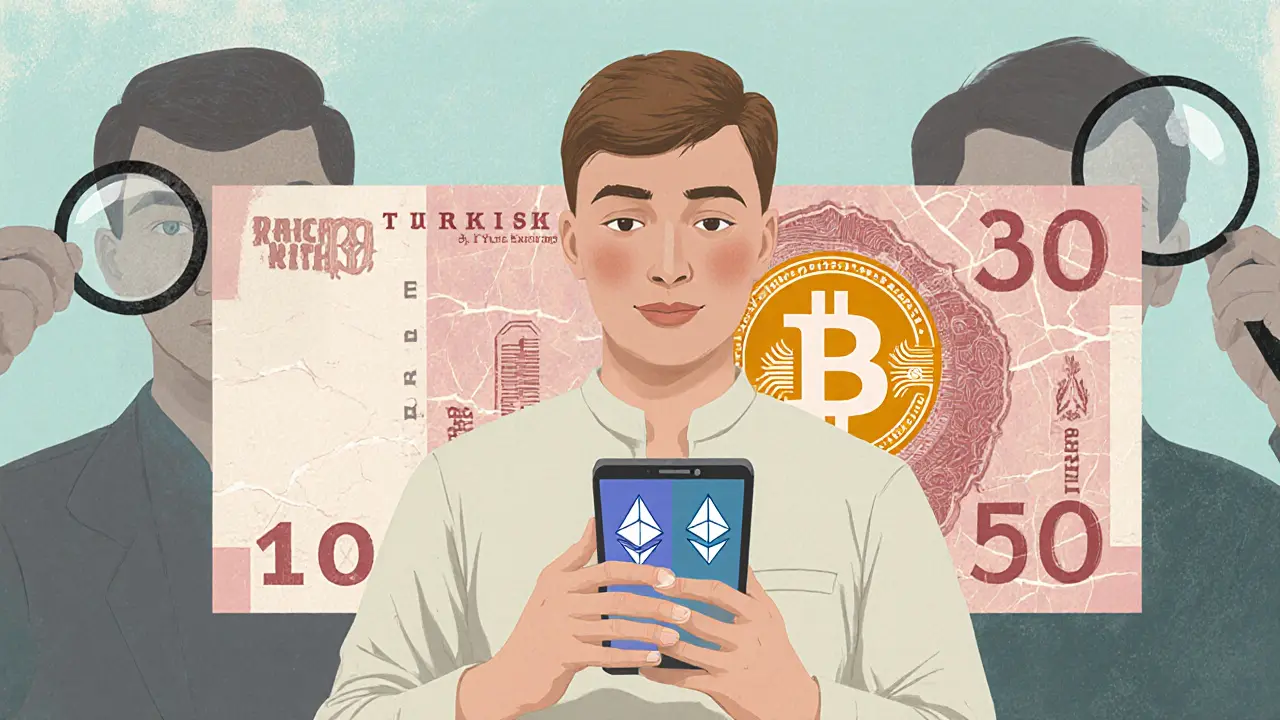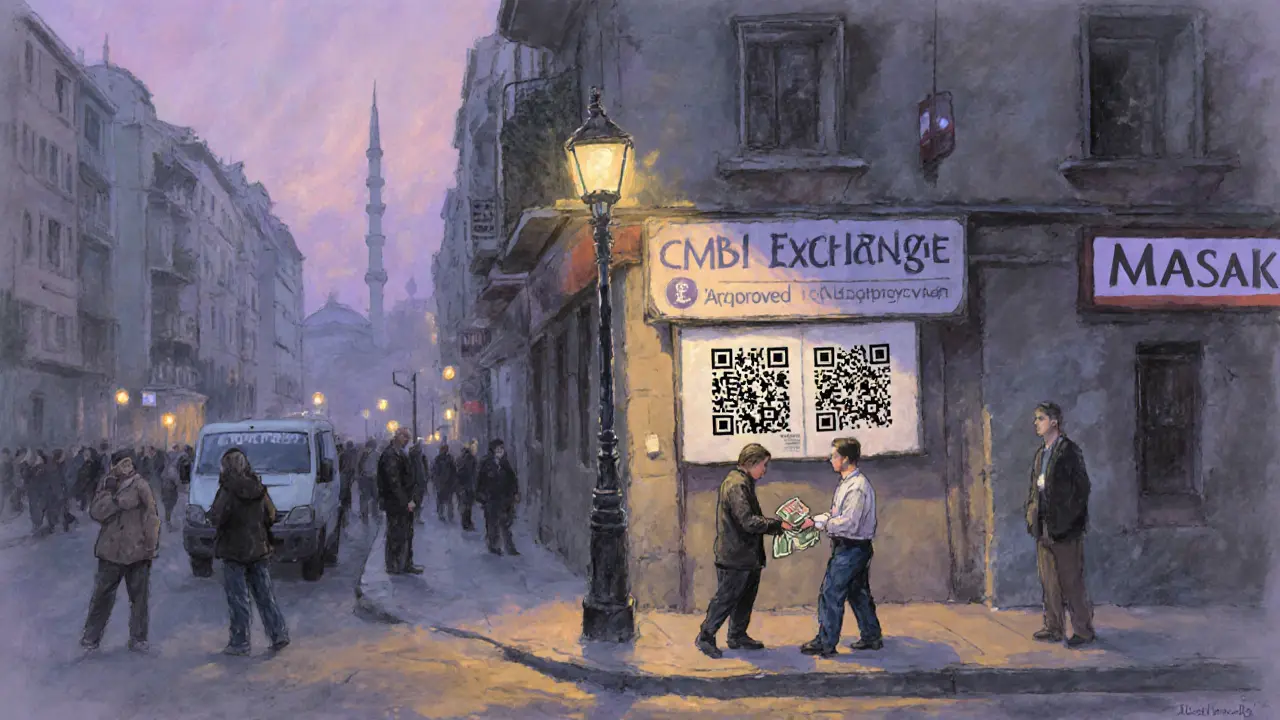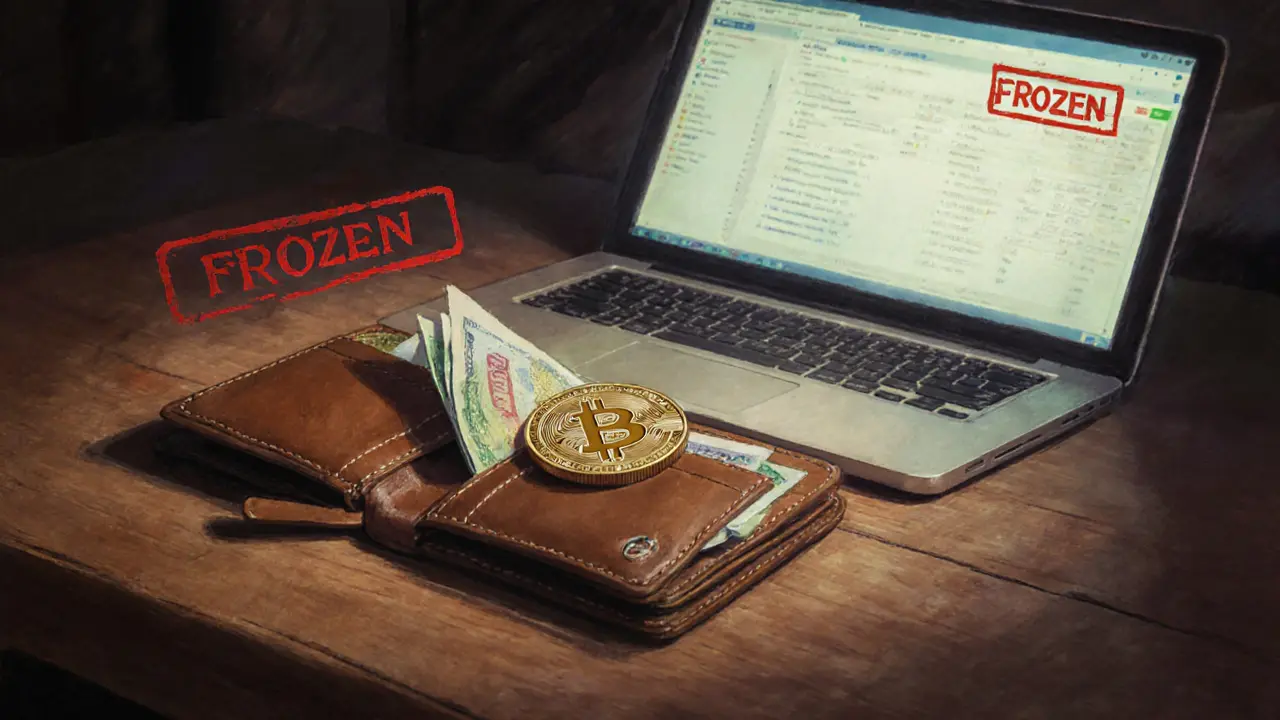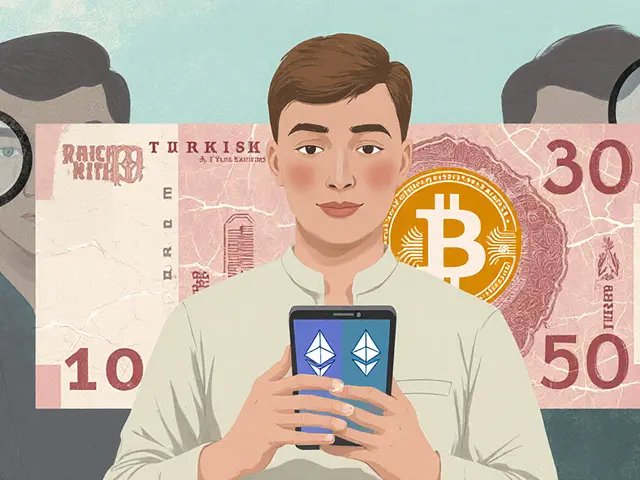Turkish Lira and Cryptocurrency Trading Restrictions: What You Need to Know in 2025

Turkish Crypto Transaction Compliance Calculator
Transaction Compliance Calculator
Enter your transaction amount to see if it triggers KYC requirements under Turkey's new regulations effective February 2025.
TRY
Enter your transaction details to see compliance requirements.
If you live in Turkey and trade cryptocurrency, you’re caught in a strange middle ground: you can own Bitcoin, Ethereum, and other digital assets all you want-but you can’t use them to pay for coffee, rent, or even a phone bill. That’s the reality since April 2021, and it’s about to get even tighter in February 2025. The Turkish government isn’t banning crypto. It’s trying to control it-hard. And the Turkish lira, despite its wild swings, remains the only legal tender. This isn’t about stopping innovation. It’s about stopping money from leaving the country.
Why Turkey Blocks Crypto Payments but Allows Trading
Turkey has one of the highest crypto adoption rates in the world, ranking 11th globally. With inflation hitting over 60% in 2023 and the lira losing nearly 70% of its value against the dollar since 2020, ordinary Turks turned to Bitcoin and stablecoins as a survival tool. But the Central Bank of Turkey (TCMB) saw something else: capital flight. People were buying crypto, sending it overseas, and cashing out in dollars. So they banned payments. Not ownership. Not trading. Just using crypto like money. This isn’t unique globally. The EU lets you pay with crypto under MiCA rules. The U.S. lets you use it in some states. But Turkey drew a hard line: crypto is an investment, not a currency. That’s why you can trade on BTCTurk or Paribu all day, but you can’t scan a QR code to pay your grocery bill with ETH. The goal? Keep the lira alive by forcing people to convert crypto back to lira before spending.The New Rules Coming in February 2025
Starting February 2025, everything changes. The Turkish Capital Markets Board (CMB) is rolling out a full regulatory overhaul. Every crypto exchange, wallet provider, or custodian operating in Turkey must now be licensed. No exceptions. And the cost? It’s steep. Exchanges need at least 150 million Turkish lira ($4.1 million) in capital. Custodians? Half a billion lira ($13.7 million). That’s not a startup budget-it’s a bank’s. Smaller platforms won’t survive. BTCTurk and Paribu can handle it. Smaller players? They’ll vanish. You also can’t just sign up and trade anymore. Every transaction over 15,000 Turkish lira ($425) requires full KYC. That means your ID, proof of address, and even your source of funds. Unregistered wallets? They’ll be flagged. The government doesn’t care if you’re just holding Bitcoin. They care if you’re moving money out. And they’re watching.Who’s Watching You? MASAK and the Freeze Power
The real game-changer isn’t the licensing. It’s what the Financial Crimes Investigation Board (MASAK) is about to get. A new law, expected to pass in late 2025, will let MASAK freeze any crypto account-no court order needed. That includes wallets on exchanges, peer-to-peer platforms, and even self-custody wallets linked to Turkish IDs. If they suspect money laundering, gambling, or fraud, they shut it down. Instantly. This targets something called “rented accounts.” Criminals pay regular people in Turkey to open crypto wallets and receive stolen funds. Then they move the money abroad. It’s low-risk for the criminals, high-risk for the account holders. Under the new rules, those people aren’t just fined-they’re blacklisted. Their bank accounts, phone lines, even their ability to use digital payment apps could be cut off. This move aligns Turkey with the Financial Action Task Force (FATF), the global anti-money laundering watchdog. But it also turns every crypto user into a potential suspect. If you’re buying crypto from a friend, or selling it for cash, you’re now in the crosshairs.
How Exchanges Are Adapting (And Struggling)
To get licensed, exchanges have to build full compliance departments. They need transaction monitoring tools that track every trade, canceled order, and failed transfer. They must log where the money came from, why it’s being sent, and who owns the wallet. This isn’t just software-it’s teams of lawyers, auditors, and tech specialists. Many local firms can’t afford it. The Scientific and Technological Research Council of Türkiye (TÜBİTAK) now audits every system. Not just security. Everything. If your exchange doesn’t have a 99.9% uptime guarantee, encrypted data logs, and real-time fraud detection, you don’t get a license. PancakeSwap was blocked in July 2024 because it didn’t meet these standards. No warning. Just gone. International exchanges like Binance or Kraken? They’re staying out. Why? Because the compliance burden is too high, and the market is too risky. The only ones left are the big Turkish players who can absorb the cost-and who already have deep ties to the government.What This Means for Everyday Users
For most Turkish crypto traders, the restrictions are a double-edged sword. On one hand, they feel protected. The market is cleaner. Scams are fewer. On the other hand, they feel trapped. You can’t use your Bitcoin to buy a car. You can’t pay your freelancer in USDT. You have to sell it, wait for the lira to hit your bank account, then spend it. That’s slow. That’s expensive. And it defeats the whole point of crypto. Many are turning to peer-to-peer (P2P) trading. They meet in person. They use Telegram groups. They trade cash for crypto. But now, even that’s risky. If you sell 20,000 lira worth of BTC to someone and they get caught laundering money, you’re on the hook. The government doesn’t care if you didn’t know. You’re the link. The grey market for crypto-to-lira conversion is booming. There are now hundreds of unofficial kiosks in Istanbul, Ankara, and Izmir where you can walk in with your phone, scan a QR code, and get cash in minutes. But these aren’t regulated. They’re not insured. And if MASAK raids one, you lose everything.
Is Crypto Still Worth It in Turkey?
Yes-but only if you treat it like a hedge, not a currency. The lira is still falling. Inflation is still high. People still need something to protect their savings. Crypto remains the best tool for that. But you’re not using it to pay bills. You’re using it to store value. The tax situation is still a relief. As of October 2025, profits from crypto trading are untaxed. That could change. The Finance Ministry is already drafting rules to tax gains and cap stablecoin transfers. If that happens, the incentive to hold crypto for long-term value could drop. But for now, it’s still the only way for many Turks to keep their life savings from evaporating.What’s Next? The Future of Crypto in Turkey
Turkey isn’t going to ban crypto. It’s too popular. But it will keep tightening the screws. The February 2025 rules are just the start. Expect more: mandatory reporting of all wallet addresses, limits on how much you can convert to lira per month, and possibly even a central bank digital currency (CBDC) to compete with stablecoins. The goal isn’t to kill crypto. It’s to control it. To make sure every coin that enters Turkey is tracked, taxed, and tied to a lira account. The lira may be weak, but the government won’t let crypto replace it. Not yet. Not ever, if they can help it. For now, the message is clear: own crypto if you want. Trade it if you can. But don’t expect to use it like money. And don’t assume you’re anonymous. The system is watching. And it’s getting smarter every day.Post Comment







So you can own crypto but not buy coffee with it? That’s like owning a key but not being allowed to open any doors.
Capital flight prevention. Classic. They’re not stopping crypto-they’re stopping freedom. 🤷♂️
Honestly? I get it. If your currency’s collapsing, people will use anything to save their savings. Crypto isn’t the problem-the lira is. But the government’s panic is making things worse.
the new rules are insane. 150 million lira capital? that's like asking a lemonade stand to build a bank. small exchanges are gonna vanish and only the ones with gov ties survive. not exactly free market.
So now your crypto wallet is a crime scene if someone else used it? Brilliant. Let’s just make every citizen a potential criminal. What’s next? Mandatory crypto confessionals?
There is a profound irony here: a nation that has embraced digital currency as a lifeline against economic collapse is now weaponizing regulation to strangle its own people’s autonomy. The lira may be the only legal tender, but it is not the only moral one. When a currency loses its dignity, its citizens seek dignity elsewhere-even if it means bending rules, breaking norms, or trusting algorithms over bureaucrats.
What Turkey is doing is not unique-it is merely extreme. We have seen this before in Venezuela, Argentina, Lebanon. But Turkey’s case is different because its people are not just surviving-they are innovating. They are creating underground economies, peer-to-peer trust networks, and informal financial ecosystems that operate outside state control. And yet, the state responds not with empathy, but with surveillance.
It is not about money. It is about power. The government fears what happens when trust moves from institutions to code. It fears the decentralization of value. It fears that if people can bypass the lira, they might someday bypass the state itself.
But here is the truth: you cannot outlaw human ingenuity. You can only drive it underground. And when you do, you don’t eliminate risk-you amplify it. The unregulated kiosks, the Telegram trades, the rented wallets-they are not signs of failure. They are signs of resilience.
Perhaps the real question is not whether crypto should be controlled-but whether control is even possible in a world where a teenager in Ankara can outmaneuver a central bank with a smartphone and a QR code.
They call it ‘stopping capital flight’ but really they’re just trying to keep people from realizing the lira is a sinking ship. You can’t stop people from swimming-only from building better boats. And now they’re burning the boats instead of fixing the ocean.
I’ve seen this play out in three different countries. The moment governments try to outsmart their own people’s survival instincts, they lose. Always. The people adapt. They find loopholes. They trade in back alleys. They use ghost wallets. They become invisible. And then? The government panics and makes it worse.
That’s why the MASAK freeze power is terrifying. No court order? That’s not regulation-that’s dictatorship with a tech twist. You don’t need a warrant to arrest someone anymore? Just flag their wallet and vanish them? That’s not finance. That’s Orwell with a blockchain.
And the irony? The only people who can afford to comply are the ones already cozy with the regime. So now crypto is a club for the politically connected. The rest of us? We’re criminals by default. Welcome to the future.
But here’s the kicker: the more they clamp down, the more crypto spreads. Because it’s not about technology. It’s about trust. And right now, Turks trust Bitcoin more than their own central bank. And no law can change that.
So… they’re banning crypto payments because people are using it to escape inflation… but they’re not banning crypto itself? That’s like banning the use of a fire extinguisher because people are using it to put out fires you caused. The logic is… breathtakingly bad.
And now they’re forcing exchanges to spend millions on compliance? Who’s paying for that? The users. Through fees. Through delays. Through fear. This isn’t regulation-it’s a tax on survival.
Also, TÜBİTAK auditing every system? That’s cute. They don’t even have enough engineers to fix their own power grid. How are they gonna audit decentralized wallets? By sending inspectors to knock on doors asking, ‘Hey, do you have a private key?’
And MASAK freezing wallets without a court order? That’s not financial oversight-that’s state-sponsored theft. If you can seize assets without due process, you don’t have a rule of law. You have a regime.
And yet… people still trade. Still buy. Still hold. Because what’s the alternative? Watch your savings evaporate? No thanks. I’ll take the risk of being watched.
They think they’re controlling the market. They’re not. They’re just making it more dangerous. And that’s exactly what makes it more attractive.
Anyone who thinks this is ‘fair’ hasn’t studied financial history. This is textbook authoritarian economic control disguised as consumer protection. The government is not protecting citizens-they are protecting their own power. And anyone who defends this is either complicit or profoundly naive.
Bro the lira is trash so ofc people use crypto. But now the government is acting like they’re the IMF. Stop pretending you care about the people. You just want to keep your elite bank accounts safe.
They’re using MASAK to track everything because they’re scared the Fed is behind this. Crypto isn’t about inflation-it’s about de-dollarization. The U.S. is pushing this to destabilize Turkey. Mark my words: this is a covert war. The 150M lira cap? That’s not a regulation-it’s a Trojan horse. They want to force all crypto into state-controlled wallets. Next thing you know, every Bitcoin transaction gets flagged as ‘anti-Turkish activity’.
They banned crypto payments but let you trade? That’s like banning cash but letting you trade gold bars. Makes zero sense unless they want to control the exit points. And they do. They’re not stopping crypto-they’re making sure every coin turns back into lira before it leaves. It’s not about control. It’s about extraction.
People are using crypto because the system failed them. That’s not a flaw in crypto. That’s a flaw in policy. Fix the lira. Don’t punish the people trying to survive it.
Why are we even discussing this? Turkey has no business being in the top 11 for crypto adoption. Their economy is a dumpster fire. This is just the natural consequence of irresponsible monetary policy. Let them burn. The world doesn’t need another failed state pretending to be a fintech hub.
These rules are the only sane response to a nation that has surrendered its sovereignty to digital chaos. If your currency is collapsing, it’s not the fault of Bitcoin-it’s the fault of your leaders. And now they’re finally doing something about it. No more financial anarchy. No more shadow economies. No more letting citizens play roulette with their savings. The state must protect the people-even from themselves.
And if you think MASAK freezing wallets is ‘tyranny’-you’ve never lived under real chaos. At least now, if you’re laundering money, you get caught. That’s not oppression. That’s responsibility.
Let the small exchanges die. They were never legitimate. Let the kiosks vanish. They were criminal fronts. Let the unregulated P2P trades stop. They were money laundering pipelines. This isn’t crackdown. It’s cleanup.
And if you think the U.S. or EU would allow this kind of chaos? You’re delusional. They’ve already banned crypto payments in 12 countries. Turkey is just the first brave enough to say: ‘Enough.’
it’s wild how people in the us act like they’re shocked by this. if your currency’s falling 70% in 5 years, you’d use crypto too. the real issue is the government not fixing the lira instead of punishing people for trying to save their money.
Let’s be real-this isn’t about money. It’s about control. The government knows crypto is the only thing keeping the middle class from rioting. So they let people own it, but make sure they can’t use it. That way, people stay alive but stay powerless. Smart. Evil. Brilliant.
They’ve turned crypto into a prison with a view. You can look at your wealth, but you can’t touch it. You can trade it, but you can’t spend it. You can hold it, but you can’t escape it.
This is psychological warfare. And it’s working.
crypto is the only thing keeping turks from starving. the gov should be thanking them, not spying on them. 😔
It is not the nature of cryptocurrency to be a medium of exchange. It is the nature of human beings to seek freedom from oppressive systems. When a nation’s currency loses its integrity, the people turn to alternatives-not out of rebellion, but out of necessity. The Turkish government’s response is not a policy-it is a surrender to fear. And in surrendering to fear, they have created a system that punishes survival.
What is more dangerous: a decentralized digital asset, or a centralized institution that has failed its people so profoundly that they must seek refuge elsewhere?
The lira may remain legal tender. But the heart of the people has already moved on.
They say crypto is an investment-not a currency. But if you can’t use it to buy bread, then it’s not an investment. It’s a ghost. A digital ghost haunting your wallet while your rent goes up and your salary shrinks. That’s not finance. That’s torture.
And the fact that they’re forcing exchanges to spend millions on compliance? That’s not regulation. That’s a tax on hope. The big players survive. The small ones? They vanish. And the people? They lose access. So who benefits? Not the people. Not the market. Just the state and its cronies.
Meanwhile, the real crypto economy is thriving in back alleys, Telegram groups, and cash trades. The government can’t regulate that. Because you can’t regulate trust. And that’s the real threat.
They think they’re controlling the future. But the future is already here. It’s just not on their radar.
meh. turks are just mad because they can't spend their crypto. big whoop.
There is a quiet dignity in how Turkish citizens are navigating this crisis-not with rage, but with resourcefulness. They are not asking for permission. They are not waiting for approval. They are building systems of trust outside the system. That is not rebellion. That is resilience. And it deserves respect, not surveillance.
in india we have similar problems with forex rules but at least we can still use crypto to send money abroad. turkey is going full authoritarian. sad to see a country with so much potential become so paranoid
wait till they introduce a cbdc. then they’ll say ‘see? we gave you digital money. now stop using bitcoin.’ but the cbdc will be tracked, taxed, and frozen on command. meanwhile bitcoin? still anonymous. still free. they’re not fighting crypto. they’re fighting freedom.
theyre not gonna ban crypto. theyre just gonna make it so hard to use that people give up. but they dont get it-when you make something illegal, you dont kill it. you make it stronger.